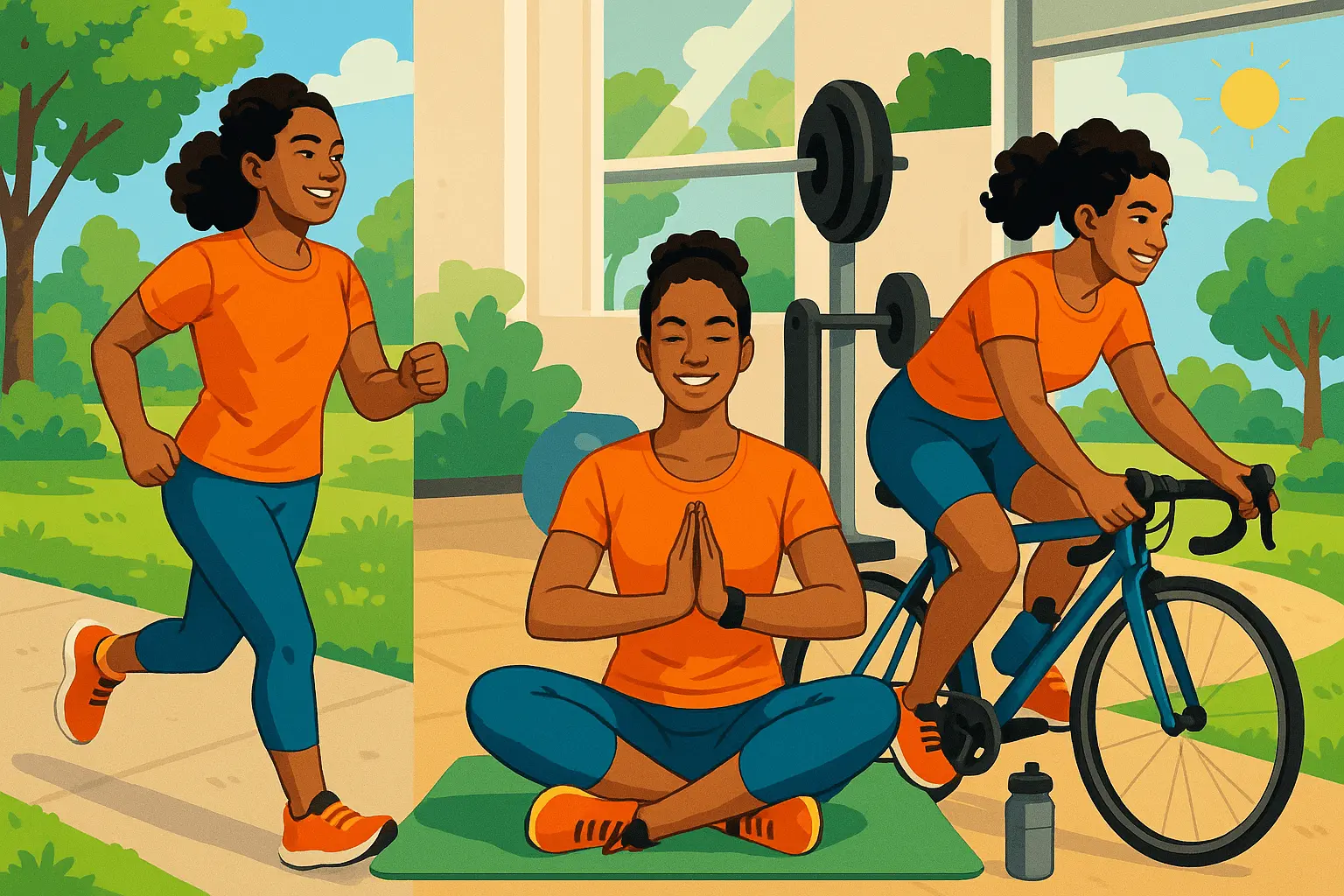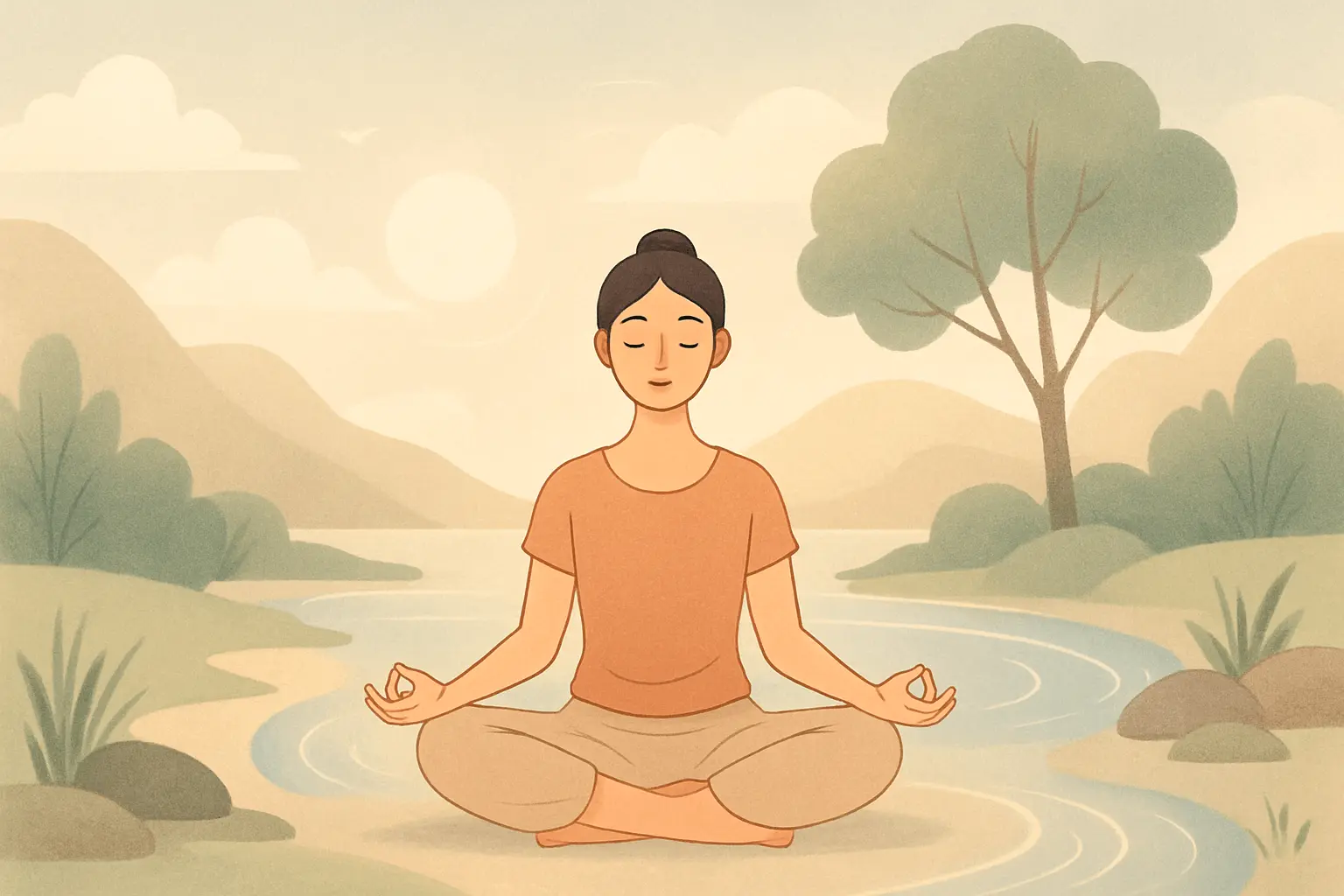Reverse Obesity Organically– Reclaim Your Health

Welcome to a healthier, happier you! In today’s fast-paced world, it’s easy to get caught up in the chaos and forget about our well-being. But achieving better health doesn't require complicated routines or expensive products—sometimes, the simplest habits are the most effective.
By making small, sustainable changes to your daily lifestyle, you can unlock the true potential of your health and happiness. Healthy eating, mindful fasting, quality sleep, regular exercise, and mental peace are the building blocks of a long, fulfilling life. These habits not only keep your body strong but also nurture your mind and spirit, helping you lead a more balanced and vibrant life.
In this guide, we’ll explore how easy it can be to integrate these habits into your everyday routine, offering practical tips that are relevant and relatable for you. Whether you’re looking to make one simple change or overhaul your lifestyle, it all starts with the right mindset and commitment to taking action—today!
Healthy Eating Habits -
Understanding the Basics
Healthy eating doesn’t have to be complicated. It’s about choosing the right types of food in the right amounts. The key to a balanced diet is incorporating a variety of food groups: vegetables, fruits, whole grains, lean proteins, and healthy fats. This approach ensures your body gets the nutrients it needs to stay strong and energized. Focus on eating foods that nourish your body, rather than those that leave you feeling sluggish or tired.
When it comes to timing, aim for a balance. Rather than skipping meals or eating large portions at once, try to eat smaller, balanced meals throughout the day. This keeps your metabolism active and prevents energy dips. Make sure to incorporate a good mix of carbs, proteins, and healthy fats into each meal to keep your energy levels steady.

Meal Frequency & Portion Control
One of the easiest ways to improve your eating habits is by paying attention to how often and how much you eat. Instead of having two or three large meals, try to break them down into smaller, more frequent meals. Eating five to six smaller meals can help keep your metabolism steady and prevent overeating.
Portion control is also essential. In our daily routines, it’s easy to eat more than our bodies need. A good way to control portion sizes is to listen to your hunger signals. Try to eat slowly and stop when you feel satisfied, not full. Eating with awareness can help prevent overeating and encourage better digestion.

Local Food Choices
Eating healthy doesn’t mean you have to buy expensive or imported items. Bangladesh is blessed with a variety of fresh, locally available foods that are both nutritious and affordable. For example, adding leafy greens like spinach (palong shak) or mustard greens (shorshe shak) to your meals can boost your vitamin intake. Seasonal fruits like mangoes, bananas, and papayas are full of essential vitamins and minerals. Locally sourced rice and lentils (dal) are great sources of fiber and protein, and adding fish to your diet, especially varieties like hilsa (ilish), provides a good source of omega-3 fatty acids.
Local foods are not only cost-effective but also support your health in a culturally relevant way, making healthy eating simpler and more sustainable for your lifestyle.

Staying Hydrated
Water is essential for your body to function at its best. Staying hydrated is one of the simplest yet most powerful ways to improve your health. Aim to drink at least eight glasses of water throughout the day. Drinking water helps your body stay hydrated, aids in digestion, and keeps your skin glowing.
It’s also important to limit sugary drinks like sodas, sweetened teas, or energy drinks. These drinks can add empty calories and contribute to weight gain and other health issues like diabetes. Instead, try drinking water, herbal teas, or coconut water to stay refreshed and energized.

Mindful Eating
Mindful eating is about paying full attention to the experience of eating. It encourages you to be present and aware of how food makes you feel, both physically and emotionally. When you eat mindfully, you’re more likely to recognize when you’re hungry, when you're satisfied, and when you've had enough.
To practice mindful eating, try to avoid distractions like TV or smartphones during meals. Sit down, take your time, and enjoy each bite. Pay attention to the textures, smells, and tastes of your food. Chewing slowly not only helps with digestion but also helps you feel full sooner, which can prevent overeating.
💬 It’s time to stop managing symptoms and start healing.
👉 Visit our center today and get a FREE doctor consultation to begin your transformation.
What you will get
FREE Doctor Consultation
Customized Natural Weight Loss Plan
Ongoing Expert Support
Visit Our CenterFasting Habits - What Is Fasting and Why Is It Beneficial?

The health benefits of fasting are numerous. Studies have shown that intermittent fasting can help regulate blood sugar levels, promote weight loss, improve digestion, and even enhance brain function. It also allows the body time to repair itself at a cellular level, potentially reducing the risk of chronic diseases. For many, fasting leads to clearer thinking, improved energy levels, and a sense of discipline when it comes to eating habits.
Fasting also offers a way to reset the digestive system, especially in a culture where overeating and large portions are common. This habit can help you reconnect with your body’s natural hunger and fullness cues, improving overall eating habits in the long term.
Simple Fasting Techniques
Fasting doesn’t have to be complex, and there are simple ways to incorporate it into your routine. For beginners, here are a few fasting techniques that can easily fit into a Bangladeshi lifestyle:
The 12-Hour Fast
One of the simplest ways to start fasting is by fasting for 12 hours each day. This could mean, for example, eating dinner by 7 p.m. and then not eating again until 7 a.m. the next morning. This approach gives your digestive system a much-needed break and encourages healthier eating patterns.
The 16/8 Method
This is one of the most popular forms of intermittent fasting. It involves fasting for 16 hours and eating within an 8-hour window. For example, you could have breakfast at 10 a.m. and finish eating by 6 p.m. This method is quite practical, as it simply involves skipping breakfast and eating lunch and dinner within a set time frame.
The Weekend Fast
If fasting every day seems too challenging, you can start with fasting on weekends. Choose one or two days per week to follow a simple fast, like having a light lunch and skipping dinner. This gives your body a break without requiring a daily commitment.
Respecting Body Signals
Fasting can be a powerful tool for improving your health, but it’s essential to listen to your body. While fasting can have numerous benefits, it’s important not to push yourself too hard, especially in the beginning. Pay attention to how you feel during the fasting period—if you experience dizziness, extreme hunger, or fatigue, it’s okay to break your fast early. The goal is not to suffer but to nourish your body in a way that feels balanced.

As you fast, make sure to stay hydrated by drinking water, herbal teas, or coconut water. If you feel lightheaded or weak, try eating a healthy snack and resuming fasting the next day with a more gradual approach.
The key is to respect your body’s needs and adapt your fasting habits accordingly. If you find that fasting regularly causes negative effects, it may not be the right approach for you at this time. There are other ways to maintain a healthy lifestyle without fasting.
When Not to Fast
Fasting isn’t suitable for everyone. Some people should avoid fasting or consult a healthcare professional before attempting it. Here are a few situations when fasting may not be recommended:
Pregnant or Breastfeeding Women
During pregnancy and breastfeeding, your body requires extra nutrients to support both you and your baby. Fasting may not provide the necessary energy and nutrients during this time.
Children and Adolescents
Growing children and teenagers need regular meals to ensure they get all the nutrients for proper growth and development. Fasting could interfere with their nutritional needs.
People with Certain Medical Conditions
If you have medical conditions like diabetes, eating disorders, or heart problems, fasting may not be safe without medical supervision.
Elderly Individuals
We age, our bodies may require more regular nourishment, and fasting might not be ideal for older adults without professional guidance.
Sleep Habits - The Importance of Sleep
Sleep is often the most overlooked aspect of health, yet it plays a critical role in both your physical and mental well-being. When you sleep, your body doesn’t just rest—it goes into repair mode. Sleep supports your immune system, helps with muscle recovery, regulates hormones, and improves memory and learning. Getting enough sleep is also essential for maintaining a healthy weight, reducing stress, and enhancing mood.
Sleep isn’t just about quantity, but also quality. A good night’s sleep can boost your productivity, help you feel more energized throughout the day, and improve your overall health. In a country like Bangladesh, where long work hours and busy schedules can easily disrupt sleep patterns, it’s important to make sleep a priority.
Establishing a Sleep Routine
Dealing with Sleep Problems
Having a consistent sleep schedule is one of the simplest and most effective ways to improve your sleep. Try going to bed and waking up at the same time every day, even on weekends. This helps regulate your body’s internal clock, making it easier to fall asleep and wake up naturally.
Start by setting a bedtime that allows for at least 7-8 hours of sleep. If you struggle to fall asleep, avoid caffeine or heavy meals in the evening. Light reading, listening to calming music, or taking a warm bath can also help signal to your body that it’s time to wind down.
A simple routine, such as turning off bright lights an hour before bed and using that time to relax, can make a huge difference in how easily you fall asleep.
If you’re struggling with sleep issues such as insomnia or poor sleep quality, it’s important to seek help. Chronic sleep problems can affect your overall health and quality of life. Talk to a healthcare professional or reach out to Dr. Jahangir Kabir for personalized advice on how to improve your sleep. Small changes in your routine or lifestyle can make a big difference in achieving better sleep.
Improving Sleep Quality
Improving the quality of your sleep is just as important as getting enough sleep. Here are a few techniques to help you get more restful sleep:

Limit Screen Time Before Bed
The blue light emitted by phones, tablets, and televisions can interfere with your body’s ability to fall asleep. Try to avoid screens at least 30-60 minutes before bedtime.

Create a Sleep-Friendly Environment
Make your bedroom a peaceful retreat by keeping it dark, quiet, and cool. You can use blackout curtains to block outside light or a fan to create a soothing white noise.

Relaxation Techniques
If you find it hard to wind down, try practicing relaxation techniques such as deep breathing, progressive muscle relaxation, or meditation. These can help calm your mind and prepare your body for restful sleep.

Avoid Stimulants
Avoid consuming caffeine or alcohol close to bedtime. Both can disrupt sleep patterns and affect the quality of your rest.
Regular Exercise Habits - Starting Small

Starting an exercise routine doesn’t have to be overwhelming. If you’re new to exercise, begin with small, achievable goals. Set aside just 10-15 minutes a day for physical activity and gradually increase the duration as you become more comfortable. The key is consistency, not intensity.
For beginners, simple activities like walking or stretching can have a big impact on your health. Once you’re accustomed to regular movement, you can add more variety to your routine with activities like cycling or bodyweight exercises.
The important thing is to start with manageable steps and gradually build from there. It’s better to commit to small, consistent efforts than to push yourself too hard in the beginning.
Easy-to-Do Exercises
You don’t need expensive gym equipment or a fitness center membership to stay active. There are many simple exercises that can be done at home or outdoors without any special equipment. Here are a few to get you started:
- Walking or Jogging: One of the easiest forms of exercise, walking or jogging is great for improving cardiovascular health and increasing stamina. You can walk around your neighborhood or park.
- Cycling: Riding a bike is not only fun but also an excellent way to improve cardiovascular fitness. You can cycle around your local area, making it a social activity or a solo time for relaxation.
- Bodyweight Exercises: Simple exercises like squats, lunges, push-ups, and planks can be done anywhere. These exercises help build strength and improve muscle tone.
- Stretching: Stretching helps improve flexibility, reduce stress, and prevent injury. Simple stretches can be done throughout the day, especially if you have a sedentary job.
Making Movement a Part of Daily Routine
Exercise doesn’t always have to mean a structured workout. It’s about incorporating more movement into your day-to-day life. You can make small changes that increase your activity levels, such as:
- Walking instead of Driving: If possible, consider walking to nearby destinations instead of driving. It’s an easy way to fit in more movement and reduce stress.
- Take the Stairs: Skip the elevator and take the stairs whenever possible. It’s a simple way to get your heart rate up and strengthen your legs.
- Active Breaks: If you have a desk job, take short breaks throughout the day to stretch, walk around, or do a few minutes of light exercise. This can improve circulation and reduce stiffness.
- Stand More: Try using a standing desk or standing for a few minutes every hour to avoid prolonged sitting.
Finding Motivation
Staying consistent with exercise can be challenging, but there are several ways to stay motivated:
- Set Realistic Goals: Start with achievable goals that are specific, measurable, and time-bound. For example, aim to walk 5,000 steps a day or complete 10 minutes of exercise each morning.
- Make It Enjoyable: Choose activities you enjoy. Whether it’s dancing, playing a sport, or doing yoga, having fun with exercise makes it feel less like a chore.
- Find a Workout Buddy: Exercising with a friend or family member can help keep you accountable and make physical activity more enjoyable.
- Track Your Progress: Keep track of your progress and celebrate small wins along the way. This can help boost motivation and keep you on track.
Mental Peace Practices - Why Mental Peace Is Crucial
In today’s fast-paced world, mental peace is often the most overlooked part of well-being. However, it’s just as important as physical health. Mental peace helps reduce anxiety, boosts emotional resilience, and improves your overall quality of life. When you maintain mental peace, you can navigate life’s challenges with greater calm and clarity. It allows you to better handle stress, make clearer decisions, and enjoy more meaningful relationships. A peaceful mind also supports better physical health, as stress and anxiety can weaken the immune system, increase blood pressure, and disrupt sleep.
Taking time to nurture your mental health through practices that promote inner peace is crucial for a balanced and fulfilling life.
Breathing Exercises & Meditation
One of the easiest and most effective ways to bring calm to your mind is through deep breathing exercises and meditation. These practices allow you to relax and clear your mind, helping you to stay grounded during stressful moments.
- Deep Breathing: Start by sitting comfortably with your back straight. Close your eyes and take a deep breath through your nose, filling your lungs fully. Hold the breath for a few seconds, then slowly exhale through your mouth. Repeat this process for 5-10 minutes. Deep breathing lowers stress hormones, reduces anxiety, and enhances overall mental clarity.
- Meditation: Meditation is a simple yet powerful practice that helps calm the mind and improve focus. You can start with just a few minutes each day. Sit in a quiet place, close your eyes, and focus on your breathing. If your mind starts to wander, gently bring your focus back to your breath. Meditation can help reduce stress, improve sleep, and enhance emotional stability. You can also try guided meditation through apps or videos, which can make the process easier and more accessible.
Stress Management Techniques
Stress is inevitable, but how you manage it makes all the difference. Here are a few simple, everyday practices that can help you manage stress and keep your mental peace intact:
- Take Regular Breaks: Whether you’re working or studying, taking short breaks throughout the day can help refresh your mind. A few minutes of stretching, a walk around the block, or just stepping away from your work can help clear your mind and reduce stress levels.
- Practice Gratitude: Focusing on what you're grateful for can shift your mindset from one of stress to one of contentment. Start a gratitude journal where you write down three things you're thankful for each day. This simple habit can improve your mood, help you stay positive, and bring more mental peace into your life.
- Focus on Positive Thoughts: When you feel overwhelmed, take a moment to pause and focus on positive thoughts. Replace negative thoughts with affirmations, such as “I am capable,” “I am strong,” or “I am at peace.” Redirecting your focus can help ease anxiety and create a more peaceful mental state.
- Physical Activity for Stress Relief: Exercise, even in small doses, can help reduce stress hormones and improve your mood. Activities like walking, yoga, or light stretching can help release tension in the body and calm the mind.
Spiritual Practices
Spirituality can play a significant role in fostering mental peace. For many people, engaging in spiritual practices provides a sense of connection, purpose, and tranquility.
- Prayer: Whether you follow a particular religious tradition or not, taking time for prayer can be a powerful way to connect with your inner self and find peace. Prayer can offer comfort during stressful times and help center your thoughts and emotions.
- Connecting with Nature: Spending time in nature, whether in a park or by the river, can help restore mental balance. Nature has a calming effect on the mind, helping to clear mental clutter and foster a sense of peace. Take time to walk barefoot on grass or simply sit and observe the beauty around you. This connection with nature can promote relaxation and enhance your overall well-being.
Conclusion
Incorporating these simple, yet powerful, habits into your daily routine can help you lead a healthier, more balanced life. By focusing on healthy eating, mindful fasting, quality sleep, regular exercise, and mental peace practices, you can create a solid foundation for long-term well-being.
Now is the perfect time to take that first step toward a healthier lifestyle. Small changes can lead to big results, and the journey starts with you. Remember, you don’t have to do it alone. Dr. Jahangir Kabir is here to support you every step of the way, offering personalized guidance and advice through free consultations.
Start your healthy living journey today—because your health matters!
📍 Visit Our Office or Shop
At Ultimate Organic Life, we provide a wide range of healing foods, premium supplements, and lifestyle essentials to support your obesity reversal journey. Whether you want personalized advice or want to purchase natural products recommended by Dr. Jahangir Kabir, our expert team is here to help.
📞 Helpline: 09678-242404
